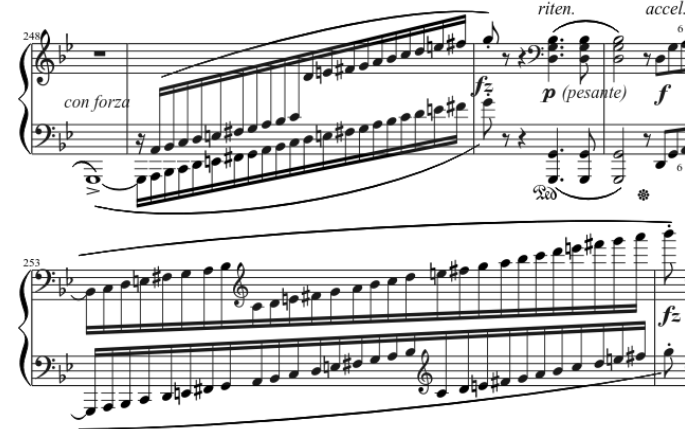Two things.
First, those scales need to run pretty quickly, it is true. Are you able to play any scales at, say, 144? Probably not. You have to work at them. And, all the while you're working on them, it often seems like you're not making any progress. But then one day you sit down and run one off, and it suddenly sounds a bit better than it did just the day before.
I suggest that you practice your G melodic minor scale, both in octaves and in tenths, four octaves. Make sure that you don't allow yourself to let the hands get uneven. Work on it very slowly (start with, say, one note per second or 60 on the metronome, and two octaves is ok to begin with), note by note, making sure that each hand hits at exactly the same time. As you get the evenness, the speeding up will happen naturally on its own.
If you aren't finding that to be the case, then it's most likely because you aren't being rigorous enough with yourself in paying attention to that evenness. Probably because you are letting your right hand tantalize you a bit, because, you know, it plays so much better than your left (if you're left-handed, then the opposite is true of course), and so is so much closer to what you want.
One of my teachers once told me that he spends three times as much time working on his left hand as he does with his right. Your right hand has to slow down and give your left hand a chance to keep up with it. Don't let yourself become impatient; a way to not make progress is to keep going over things wrong. If you do that, don't expect things to improve; you're just teaching your hands how to play things wrong. Then you have to un-teach them, and that's much tougher than teaching them right in the first place.
If you don't work out the problems with the evenness, they will magnify exponentially as you attempt to speed up the scale. So work on it.
The next thing is that if you can't play your scales evenly, you are having problems with most of the rest of the piece as well. Don't obsess over one detail or another and gimp your way through the "parts that you're putting off until later." If you're practicing in problems, you'll have to unlearn them. So be rigorous with your approach. Don't let details go.
Above all, be patient. And don't feel like a failure if you decide to put this aside for a while (you'll have improved your G melodic minor scale, after all) and work on some less difficult Chopin music. (Mazurkas!) It's a way of breaking up problems into smaller bites. Every piece you learn well contains keys to mastering more difficult pieces.
p.s. In case you couldn't tell, I did all the things I'm telling you not to do, slopping my way through this very piece until nobody could stand to listen to me practice it any more.

